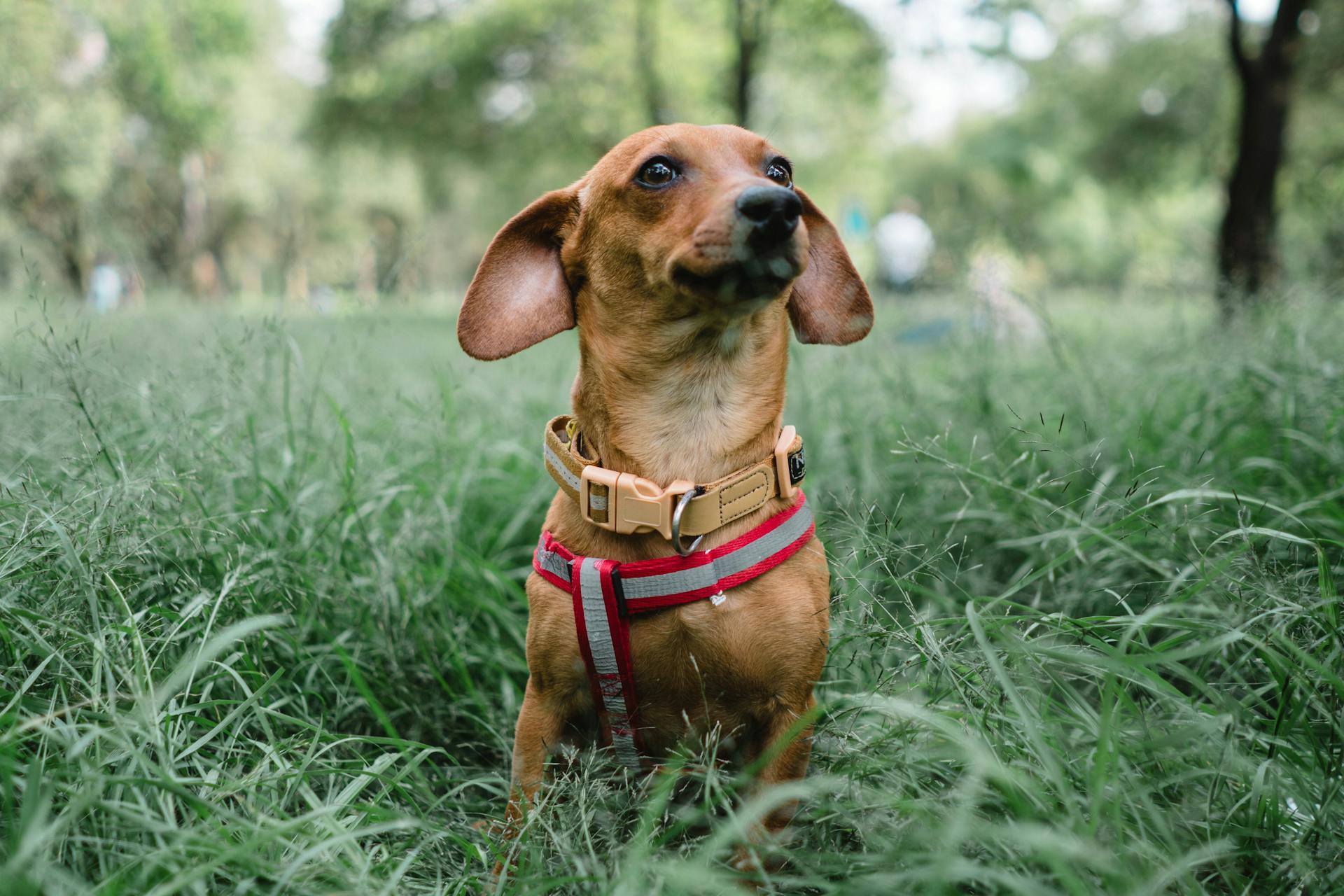
Goldendoodles are often touted as friendly and gentle, but are they truly aggressive? According to our research, Goldendoodles are generally considered to be a low-aggression breed.
They inherit their friendly nature from their parent breeds, the Golden Retriever and the Poodle. This makes them a popular choice for families with children.
However, as with any breed, proper socialization and training are key to preventing aggression. Without it, Goldendoodles can become wary and even aggressive.
Some Goldendoodles may exhibit aggression due to inherited traits from their Poodle parent, such as a strong prey drive.
Discover more: Can You Breed Two Goldendoodles
Understanding Goldendoodle Behavior
Goldendoodles are known for their loyal and loving nature, making them wonderful companion animals. They are high energy dogs that need plenty of exercise and activity.
Their social nature craves companionship and affection from people, making them great family pets. They also have an excellent level of trainability, which can help you control their behavior in different settings.
Goldendoodles may require more effort than other breeds when it comes to managing their behavior, but the reward is worth it. With patience and consistency, you can build a strong bond with your pup that will last for years to come.
If any dog is mistreated, neglected, abused, or put in a stressful situation, they can exhibit actions that might be considered aggressive. Special care and attention should be taken with dogs adopted at an older age, particularly if their background is unknown.
A dog goes through different stages of mental development, especially in their first year. Understanding these stages will help you know what to expect and how to handle it.
Certain environmental factors can trigger aggressive behavior in Goldendoodles, such as lack of exercise or stimulation, fear-based reactions, or being left alone for extended periods of time. Providing your pet with plenty of physical activity and mental stimulation can help prevent outbursts of aggression due to boredom or frustration.
Positive reinforcement training is a great way to encourage good behaviors while discouraging bad ones. This can help your Goldendoodle become a well-mannered and non-aggressive furry companion.
Socialization and Training
Socialization is key to helping your Goldendoodle become a confident and well-adjusted adult dog. Proper socialization involves exposing your pup to a variety of people, animals, environments, and experiences during their puppyhood.
By doing so, you'll help them develop good social skills and reduce the likelihood of anxiety or aggression. This is especially important during the socialization stage and fear imprint period, which occurs between 7-12 weeks of age.
To socialize your Goldendoodle effectively, arrange controlled interactions to create positive associations with new encounters. Enroll in puppy classes or socialization groups to help them develop social skills.
It's also essential to continue socialization throughout adulthood to maintain good behavior. This will help your Goldendoodle remain confident and calm in new situations.
Here are some essential socialization tips for your mini Goldendoodle:
- Expose your mini Goldendoodle to a variety of people, animals, environments, and experiences during their puppyhood.
- Arrange controlled interactions to create positive associations with new encounters.
- Enroll in puppy classes or socialization groups to develop appropriate social skills.
- Continue socialization throughout adulthood to maintain good behavior.
Positive reinforcement training is another crucial aspect of socialization and training. This approach involves consistently rewarding desired behaviors with treats, praise, or toys and using marker words like 'yes' or 'good' to signal the correct behavior.
Intriguing read: Goldendoodle Crate Training
By using positive reinforcement training, you can avoid punishment-based techniques that can cause fear or aggression. Instead, you'll create an enjoyable experience for both you and your Goldendoodle.
If your Goldendoodle is biting during playtime, it's essential to provide firm yet gentle discipline and teach them an alternate behavior. You can teach them the "leave it" or "drop it" command, which can help them learn not to bite.
Remember to ignore unwanted behaviors and only reward good behaviors. Punishment can have the opposite effect and make your Goldendoodle more anxious or aggressive.
Aggression and Bite Prevention
Aggression in Goldendoodles is a complex issue that can be caused by a variety of factors, including genetics, lack of socialization, fear, pain, or past traumatic experiences.
Early socialization is key in preventing aggression in Goldendoodles, and it's essential to start training and socialization as soon as possible.
Proper training and socialization can help your Goldendoodle become a well-mannered and non-aggressive furry companion.
If your Goldendoodle bites you, it's essential to remain calm and assertive, and not to scream or hit your dog, as this will only make them more likely to bite again in the future.
To address growling or snapping in mini Goldendoodles, it's crucial to understand the underlying causes and approach training with patience and consistency.
Here are some key strategies to prevent aggression in Goldendoodles:
- Observe the situation: Assess the triggers causing the growling or snapping behavior.
- Seek professional help: Consult a certified dog behaviorist or trainer.
- Implement positive reinforcement: Use rewards for good behavior.
- Create a safe environment: Reduce potential stressors and provide a secure space.
- Be consistent: Maintain a predictable routine and training approach.
Regular training and being a responsible pack leader can help correct common behavior problems in mini Goldendoodles, such as separation anxiety, excessive barking, and aggression towards strangers.
Mouthing is a normal puppy behavior that can be easily corrected through careful training, but if your dog shows other signs of aggression, such as growling or baring their teeth, it's best to consult your vet.
Addressing Aggression
If your Mini Goldendoodle is displaying aggression, it's essential to seek professional help from a certified dog behaviorist or trainer who has experience dealing with this issue.
Consistency and patience are key when training your Mini Goldendoodle, using positive reinforcement techniques and avoiding any punishment-based methods.
Creating a safe environment for your Mini Goldendoodle is crucial, as it can help minimize triggers for aggressive behavior and provide a secure space for them.
Some common behavior problems in Mini Goldendoodles include separation anxiety, excessive barking, and aggression towards strangers, which can be corrected with regular training and being a responsible pack leader.
Here are some steps to take if you suspect aggression in your Mini Goldendoodle:
- Seek professional help from a certified dog behaviorist or trainer
- Work with a veterinarian to rule out any underlying medical issues
- Use positive reinforcement techniques and avoid punishment-based methods
- Create a safe environment to minimize triggers for aggressive behavior
Seek Professional Help
If your Mini Goldendoodle is displaying aggression, it's essential to seek professional help from a certified dog behaviorist or trainer who has experience dealing with this issue. Consistency and patience are key when training your Mini Goldendoodle, using positive reinforcement techniques and avoiding any punishment-based methods.
A veterinarian should also be consulted to rule out any underlying medical issues that may be contributing to the aggressive behavior. This is crucial in creating a comprehensive plan to address the issue.
Creating a safe environment for your Mini Goldendoodle is vital, as it can help minimize triggers for aggressive behavior and provide a secure space for them. This can include removing potential threats or stressors from their surroundings.
Here are some key steps to take when seeking professional help:
- Work with a certified dog behaviorist or trainer.
- Rule out any underlying medical issues with a veterinarian.
- Use positive reinforcement techniques when training.
- Create a safe environment for your Mini Goldendoodle.
Addressing Pet Behavior Problems
If your Goldendoodle is showing signs of aggression, it's essential to take action right away. The first step is to determine the underlying cause, which could be physical pain or fear, so get them to the vet for a checkup as soon as possible.
Consulting a certified dog behaviorist or trainer is crucial when dealing with aggression, especially if your Mini Goldendoodle is displaying this behavior. They can help you identify the root cause and develop a plan to address it.
Creating a safe environment for your Goldendoodle is vital in minimizing triggers for aggressive behavior. This can be achieved by ensuring they have a secure space to retreat to when feeling overwhelmed.
Adopting an older Goldendoodle can be a rewarding experience, but it's essential to be aware of the potential for aggression due to their unknown background. With the right training and treatment, they can overcome a troubled past.
Proper socialization and positive reinforcement training are key to preventing aggression in Mini Goldendoodles. This can help them become well-mannered and non-aggressive furry companions.
Some common behavior problems that can be corrected with regular training include separation anxiety, excessive barking, and aggression towards strangers.
Here are some essential steps to take when addressing aggression in your Goldendoodle:
- Get a veterinary checkup to rule out any underlying medical issues.
- Consult a certified dog behaviorist or trainer for professional help.
- Create a safe environment to minimize triggers for aggressive behavior.
- Use positive reinforcement techniques and avoid punishment-based methods.
Common Issues and Solutions
Goldendoodles, like any dog, can exhibit behavior problems, including separation anxiety, excessive barking, and aggression towards strangers. These issues can be corrected with regular training and being a responsible pack leader.
Some Goldendoodles may develop aggressive behaviors due to being mistreated, neglected, or abused, or if they're put in stressful situations. This is not inherent to the breed, but rather a result of their environment.
Dogs adopted at an older age, especially those with unknown backgrounds, may have a higher likelihood of exhibiting aggressive behavior due to their past experiences. With the right training and treatment, they can overcome a troubled past.
Common signs of aggression in Goldendoodles include growling or snapping, biting or nipping, and resource guarding. Recognizing these behaviors early on is crucial to address them and keep everyone safe.
Goldendoodles are generally not inclined towards aggression, but individual circumstances can lead to such behaviors. Providing special care and attention, especially for older dogs, can help prevent these issues.
Frequently Asked Questions
Goldendoodles typically grow out of their biting phase between six and nine months of age, once they've gotten all their adult teeth. However, it can take longer for some pups, and they may stop biting by their first birthday.
Never play rough games with your Goldendoodle that involve hitting or wrestling, as this can encourage them to bite. Instead, focus on teaching basic obedience commands like "off" and "drop it".
A different take: Shiba Inu Biting
Providing plenty of chew toys can help satisfy your Goldendoodle's need to gnaw and reduce biting. Early socialization is also vital, as it teaches your puppy how to interact with you, other people, and other pets.
If your Goldendoodle is older than a year and still biting, there may be an underlying issue like anxiety or boredom. You can easily fix boredom by giving your pup plenty of attention, playtime, and exercise.
Featured Images: pexels.com


